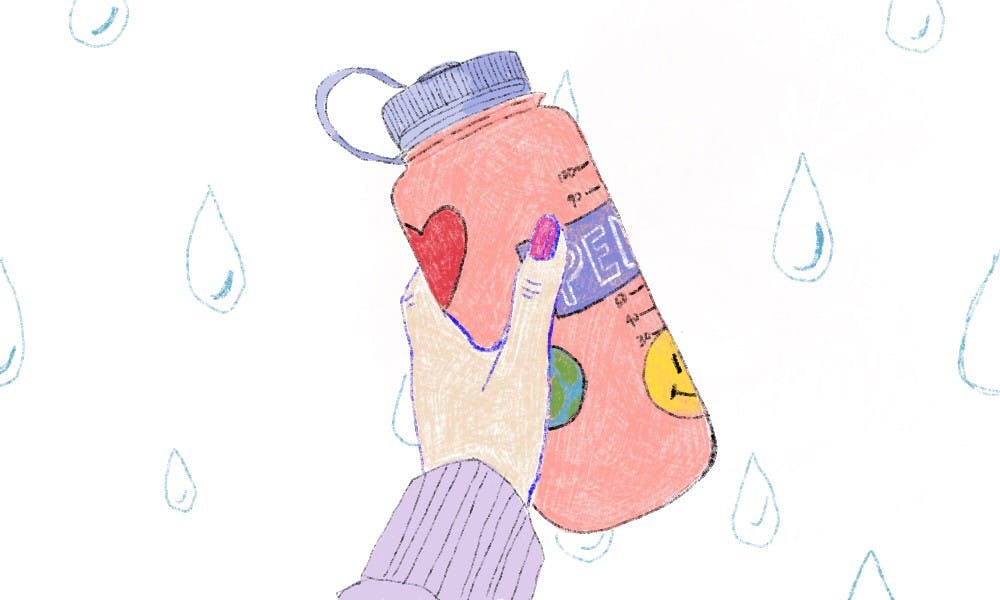For Gen Z, sustainability is sexy. Metal straws and tote bags are plastered all over social media, and new eco–friendly innovations are popping up faster than ever. Part of this urgency stems from the impending climate crisis, but also because companies and influencers generate profits when everyone buys into the idea of sustainability. This begs the question—are sustainable products, specifically clothing, even sustainable to begin with?
It’s no secret that the fashion industry is a huge contributor to climate change. Whether it’s through mass reproduction of textiles, shipping, or packaging, the waste generated by clothing companies has a massive impact on the environment.
It’s clear that large companies are harming the environment, but what about Penn students? With endless formals and nights out, accompanied by the pressure to always look presentable and the fact that most busy students aren’t buying their clothes from brick and mortar stores anymore, Penn has a sustainability problem.
However, there are organizations on campus that are looking to encourage sustainability within the student body, especially when it comes to fashion. Whether it’s through giving students easy ways to recycle their textiles or helping them cut down on buying new clothes through rentals and thrifting, the possibilities are endless.
Madeline Lau (C, W ‘22) is a Rent the Runway campus ambassador, and while the group's message isn’t explicitly geared towards sustainability, their programs can help students curb their habit of buying new clothes for every event that comes up. Madeline explained both the personal and global effects of a clothing rental service, saying that for her, Rent the Runway has minimized the amount of money she spends on high–quality clothing that tends to be made more sustainably than cheaper fast fashion.
There’s also the all–important aspect of packaging. Madeline said, “There’s less stuff that goes to the landfill…If I didn’t do Rent the Runway, I’d probably have like, 12 packages in my mailbox right now.”
Marina Dauer (C ‘22) and Caitlyn McCloskey (E ‘22) are the co–chairs of Penn Environmental Group, Penn’s oldest and largest student environmental organization. Marina explained that the club has spanned 50 years of student activism, with its scope beginning with the first Earth Day. Marina said, “It started with running Penn’s recycling service … It was all student–run by members of the club … Today we’re a broad interest group with different committees so people can focus on what they’re most passionate about.”
Among social outreach, education, and impact, Penn Environmental Group also houses a projects committee, which was the conduit through which a textile recycling initiative was organized. Caitlyn explained, “When you think of trash, you think of paper or plastic, but textiles actually make up a large percentage of landfills. A lot of people don’t even know that it’s a problem. They don’t know how to recycle them, or that they can even be recycled.”
As a part of this initiative, plastic bins appeared in laundry rooms in the Quad and the high rises, so any kind of fabric could be easily recycled. Whether they were socks, clothes, towels, or curtains, it was important to the committee that these items—which often end up in landfills—were given a chance to be recycled, even in small quantities.
“We didn’t collect that many, maybe one bag total because we started the project at the end of the year. There wasn’t as much publicity as we could have done, but it still was a good way to get the word out there," said Caitlyn.
Caitlyn emphasized expansion and the University’s role in giving students the option to be sustainable, saying, “I think another big problem at Penn is accessibility. We don’t know where to take our compost. We don’t know where to take our recycling. We don’t know where to take our textiles…Where is the clearly marked, very publicized compost pile? Where is the clearly marked, very publicized textile recycling center?”
Sure, students here have a huge problem with sustainability. Amazon packages, shipped clothing, plastic water bottles, mountains of single–use plastic from early morning coffees and late night Wawa runs litter campus, but student behavior could be enhanced with greater initiatives from the University as a whole.
If we want a more sustainable fashion industry or campus, we need to make an effort, but we need companies we patron to make an effort too. Small personal changes are great for altering behavior and working towards the greater goal of being more eco–friendly, but these new behavioral patterns will never be enough without changes on behalf of larger institutions and companies.
This article was updated on Monday, Oct. 7 at 9:42 p.m.

